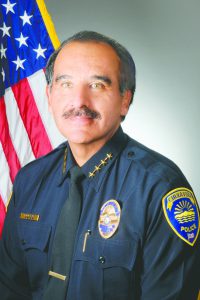It takes a leader to head any department, but it takes passion to actually make it work. David Bejarano knows this all too well.
As Chula Vista’s Police Chief, he leads a department with 225 sworn officers in a community of more than 250,000 people. It is no easy task, but Bejarano has plenty of experience. He has been in law enforcement for 35 years, achieving great success along the way.
“In this line of work, you never know what’s going to happen,” says Bejarano. “You have to remember that you’re here to serve the community. So it’s not about the title.”
But if there’s something Bejarano has plenty of—it is indeed plenty of titles. He has received numerous awards over the years for his service, community involvement and of course, for his role in law enforcement.
Years before being appointed as Chula Vista’s Chief of Police in 2009, Bejarano led San Diego’s Police Department from 1999 to 2003, making him the first Latino to ever hold that post.
“Being Chief is definitely one of the toughest jobs,” says Bejarano, “but it was such an honor. I was the first Latino to serve as San Diego’s Chief of Police. I was only 42 at the time, so I was relatively young. I think there were about 60 other highly qualified applicants,” Bejarano recalls.
Even though Bejarano now calls California home, he was raised in the historic El Segundo Barrio neighborhood of El Paso, Texas, just a few blocks from the Mexican border. It wasn’t the best neighborhood, but ironically it paved his interest in law enforcement.
Bejarano remembers constantly hearing sirens from fire trucks and patrol cars near his home. Drug trafficking, and other crimes, were simply part of daily life for Bejarano. One day, he decided he wanted to be a cop when he grew up. Decades later, his childhood dream came true.
“Family has kept me grounded over the years,” says Bejarano. “You feel like you’re working 24 hours a day sometimes, so it’s definitely been my base of support. You need that, if not, work will overwhelm you. My faith has also helped me a lot throughout the years,” he added.
Even though it’s Bejarano’s wife and their three children who help him stay grounded, as a kid, it was his parents who laid out the frame work for his success. He grew up speaking Spanish at home with his parents. Money was tight, but there was plenty of love and support to go around. His father had a high school education and his mother only completed the 8th grade. Even so, they understood the value of education and honest work.
“My parents worked six days a week,” recalls Bejarano. “My parents stressed the importance of education and hard work from the start. That’s a big part of why I decided to pursue public service.”
One of Bejarano’s daughters has followed in his footsteps. She works as a Deputy District Attorney in San Diego. As her father describes it: “She’s out there prosecuting criminals accused of major crimes.”
Even though Bejarano’s work has been carried out mostly in California, it has also taken him all the way to the White House. Back in 2003, he was appointed as head of the U.S Marshals Service for San Diego and Imperial Counties. It’s a post that requires nomination from the President and confirmation from the U.S. Senate.
“It was such a great honor,” Bejarano recalls. “I never thought a young Latino from Texas would be standing in the Oval Office one day. It’s about education and doing the right thing. That opens up all the doors.”
That’s the message Bejarano wants to get across to teenagers: What they do now, he says, can indeed come back to help them or haunt them in the future, especially when it comes to their careers.
“If someone wants a career in public service, the decisions they make in their early teens, can come back to hurt them. When I was appointed as a U.S Marshall, the FBI did a six-month investigation and background check on me, going all the way back to my 18th birthday.”
This past year, the issue of trust and accountability has come up time and time again within police departments across the nation. Bejarano has a prominent voice in the debate. In 2015, he was appointed as the President of the California Police Chiefs Association, which plays an influential role in the state’s legislative process.
“We’ve reached out to organization that represent minority groups,” explains Bejarano. “We want to make sure they’re at the table when we discuss issues like trust and racial profiling and also expanding the use of body cameras. We’ve also worked closely with state legislators regarding police data by making sure it’s available.”
Bejarano has a long list of accomplishments and awards he’s received over his many years of service. All of them are important, he says, but one has a special place in his heart.
It’s called the Ohtli Award and it is given by the Mexican government. It recognizes the work of Mexican-American leaders, who through their work, have empowered Mexican communities abroad.
Much more than just a personal recognition, Bejarano says, “it’s a recognition of my family, heritage, and service.”
The award also embodies what has come from years of hard work and dedication.
Chief Bejarano continues to live in Chula Vista, the community he has called home for nearly 30 years.
